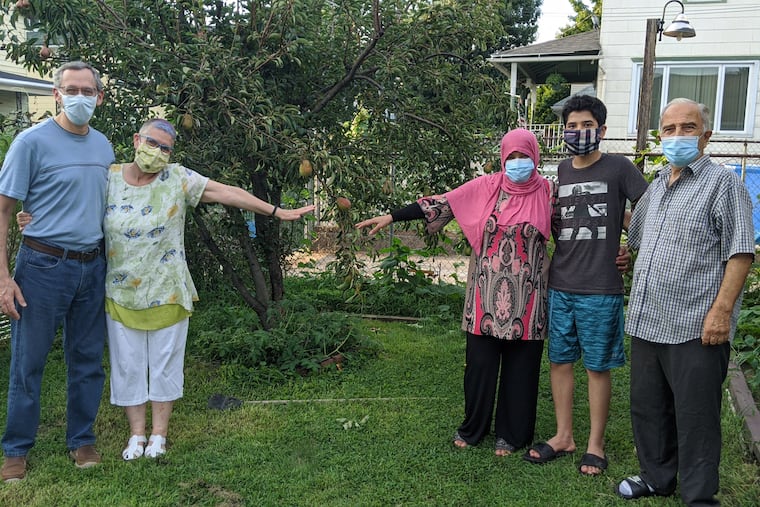An enduring sisterhood for unlikely friends
“We have a different culture, language, religion. But we have made a good friendship. A strong friendship. We are two sisters together.”

Mounera and her family wanted to learn English, so in January 2017, she nervously awaited the arrival of a stranger who offered to help.
Back in Syria, before the war, Mounera had been an elementary school Arabic teacher. Her husband, Mohammed, was an engineer. Life was good for the couple, their boys, and their extended family. Then the war came. Her two brothers were killed. The following year, her grieving mother had a heart attack and died. Mounera and Mohammed did not want to leave their homeland, but did so for the safety of their sons.
After three and a half years and an extensive vetting process in Egypt, the family was admitted into the United States and moved to an apartment in Woodlynne, N.J. Three months later, Sharon knocked on their door.
Sharon grew up in Long Island and lives in Collingswood. She has an education degree but has never formally taught. Instead, she, along with husband, Steven, 57, raised three sons. Especially now that her boys are grown, she makes mosaics and sometimes sells her art, but mostly, Sharon volunteers with the Catholic Charities Refugee Program, her synagogue, a Camden elementary school, and the Sisterhood of Salaam Shalom, a national organization that builds relationships between Muslim and Jewish women who work together in social action.
Sharon was intrigued when a friend from the sisterhood said a Syrian family who recently immigrated as refugees hoped to converse with a friendly English speaker. But she was nervous as she knocked — they knew no English, she knew no Arabic. How could this work?
Mounera opened the door. Sharon opened a language-translation app. Between bites of hummus Mohammed had made, a conversation that has really never ended began.
For Sharon, now 57, it was an almost instant connection. “There were the concrete things we have in common — she’s a teacher, and I also like to work with children. She has two sons, and I have three. But it was also this warmth — they all made me feel so welcomed and so comfortable.”
These days, Mounera, now 51, understands English perfectly and is easily understood when she speaks. But sometimes when talking about her feelings, she prefers to express herself in Arabic and let the younger of her sons, Malek, 13, translate.
“When we first came here, we didn’t know anyone,” Mounera said via her son. “We didn’t know how to start, where to find a job, how to learn the language, how to get internet service. When Sharon came, she made everything easier. She has given me her experience, she has given me information.”
Mohammed, who is now 80, is retired, but Mounera works. Her first job in the United States was not a pleasant experience. Some coworkers were unkind to her, and she feared they would use her then-limited understanding of English to take advantage of her. She turned to her new friend for advice. Sharon was angry about what was happening. “She told me I should feel safe at work,” Mounera said. Mounera quit that job and eventually found her current one as a cook at the Westin Hotel — a job she loves, and where her coworkers call her “mom.”
One day Mounera’s sister asked about her friends in the U.S., and Mounera told her about Sharon. “She asked me if she speaks Arabic, and I said, no, she speaks English,” Mounera said. “My sister asked how we could understand each other. I said, ‘We speak a different language, but we do understand. We can feel what the other means.’ ”
Mounera, Sharon, and their families enjoy celebrating everyone’s holidays together, from the Fourth of July to Halloween to Passover and sunset iftar at the end of Ramadan fasts. “Sharon always keeps our birthdays,” Mounera added. And every year since the families met, Malek and his brother, Anas, now 17, have given Sharon a Mother’s Day gift. Mounera has also joined the Sisterhood of Salaam Shalom so the friends participate together. But their favorite pastime has always been talking, perhaps while enjoying Sharon’s brownies or Mounera’s fruit smoothies.
Mounera’s confidence in English continues to grow, and thanks to her, Sharon is learning Arabic shway shway — little by little.
Mounera and Mohammed now own a home in Oaklyn. Anas is a senior in high school and hopes to be a physician. Malek, an eighth grader, hopes to play sports this year and dreams of becoming a cardiologist.
Because both of their households have members for whom COVID-19 poses extra risk, Sharon and Mounera’s friendship since March has mostly lived within a growing string of text messages sprinkled with heart emojis.
There were doorway smiles when Sharon dropped off the fabric shapes she cut and Mounera stitched into the face masks they donated.
And once, when Sharon saw Mounera’s sons on an errand then spied their mom in the backseat, the women grabbed each other’s hands for a few seconds of nearly normal hello that ended with the squish of sanitizer.
They also used this column as an excuse to spend a few precious moments together — socially distanced and masked in Mounera’s yard — so Sharon’s son Adam, 27, could snap a photo.
In that photo, each woman has an arm around her husband and, with the other, reaches toward her friend.
“We have a different culture, language, religion. But we have made a good friendship. A strong friendship. We are two sisters together,” said Mounera. When COVID-19 is no longer a threat, “I can’t wait to hug her,” she said.
“She is a good hugger,” said Sharon. “I want to hug her and not let go.”